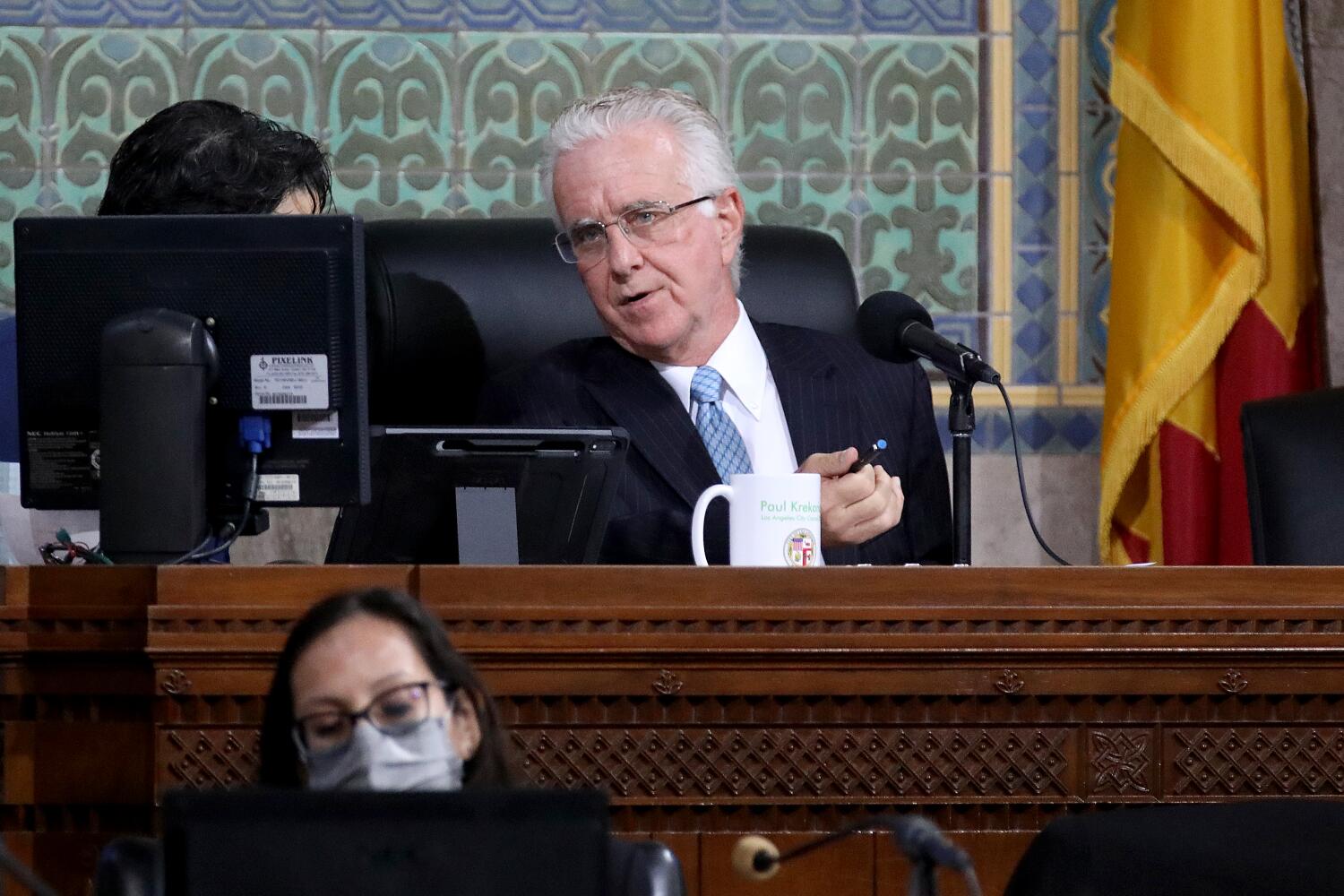
The Los Angeles City Council voted Tuesday to create a new citizens commission that would increase the size of the council, reduce the number of council meetings and consider other potential changes to how the city operates.
The 13-member commission will be tasked with developing proposals for the November 2026 ballot that would amend the city charter, which spells out the powers and duties of city departments, offices and elected officials.
The idea of expanding the 15-member council has been floating around for a few years, and several council members have agreed to the idea. Council President Paul Krekorian hopes to send a proposal to LA voters to expand the council in November.
Although a council committee The concept studied After months of meetings its members could not agree on a single strategy, and the question was left to the new commission.
The council expansion was supported by several civic groups, which argued it would improve community representation at City Hall and diversify the council’s membership.
Godfrey Plata, deputy director of the nonprofit group L.A. Forward, said his organization and others were disappointed by the council’s failure to act.
“We felt it was evasive to turn it over to the charter commission,” said Plata, whose group argued in favor of expanding the council to 29 members last year. “But we’re certainly eager to continue the public conversation about it.”
Krekorian, whose term is set to expire at the end of the year, has continued to argue in favor of expansion, pointing out that the city of nearly 4 million has roughly the same number of districts as it did nearly a century ago, when its population was much smaller.
He said reducing the size of each district would make the council more responsive to residents, while also reducing the influence of “institutional organized money” in elections.
“I think it also reduces the risk of corruption,” Krekorian said at the Los Angeles Current Affairs Forum last week.
Krekorian said the new Charter Reform Commission also will consider other issues, including how the city governs real estate development, the process for filling vacant council seats and the process for censuring or suspending elected officials who engage in wrongdoing.
Michael Feinstein, speaking on behalf of the Los Angeles County Green Party, called on the council to ensure that the commission also considers major changes to city elections, including a “ranked-choice” voting initiative that allows voters to rank their ballots. Selecting candidates in order of preference rather than selecting just one.
The last chief Restructuring of the city charter It was in 1999. That year, voters established a system of neighborhood councils and gave the mayor more power, among other things. On the same ballot, voters rejected efforts to expand the council.
It’s unclear how broad the commission’s work will be this time around. While the council can advance topics for study, the commission will also gather input from a variety of individuals and community groups.
Below The plan was approved on TuesdayMayor Karen Bass will have the power to appoint four of the commission’s 13 members. Krekorian will select two, and newly-elected Council President Marques Harris-Dawson will also select two.
According to a report, these eight will be appointed in August and September. Timeline set for the commissionOnce they meet, they will spend three months developing an action plan and selecting five additional commissioners.
The commission’s schedule calls for it to spend most of 2025 deliberating and gathering input from the public. In January 2026, its proposals will be presented to the council, which will then decide which proposals will go on the November 2026 ballot.
Feinstein, the former mayor of Santa Monica, criticized the arrangement, warning that the council would have the power to reject any proposals from the commission. She also criticized the council for allowing political appointees to be on the commission.
“This (process) creates a direct conflict of interest for the City Council in deciding the future size and powers of the council,” he said in an email to the Times.
The Charter Reform Commission is also expected to consider whether to reduce the number of council meetings — a topic that has troubled some council members in recent months.
The city charter requires the council to meet at least three days a week. Council members Katie Yaroslavsky, Tim McOsker and Eunice Hernandez recently supported a ballot proposal. reduce that number This was increased to one day a week. But other council members opposed the idea and said it needed scrutiny from a soon-to-be-formed commission.
In addition, the council on Tuesday voted to approve language for two city charter amendments on the Nov. 5 ballot. One of the amendments would establish an independent redistricting process for the Los Angeles Unified School District, which covers 26 city schools and is run by a seven-member board.
The purpose of the other ballot proposal is Strengthening the City’s Ethics Commissionwhich enforces laws related to campaign funding, lobbying and other political activities. Under the proposal, the agency would receive a minimum of $7 million per year for its operations.
Supporters say it would prevent elected officials from retaliating against the agency by cutting its budget. The proposal would triple the penalties for ethics violations and give the Ethics Commission the ability to appoint its own lawyer in some cases.
















